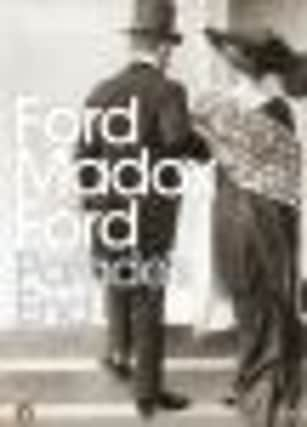Book review: Parade’s End by Ford Madox Ford


A masterly examination of destruction and regeneration, Parade’s End, which has been written for TV by Sir Tom Stoppard and stars Benedict Cumberbatch and Rebecca Hall, tells the story of a middle-class man whose world is shattered by war.
Grandson of the Victorian pre-Raphaelite painter Ford Madox Brown, the Kent-born author’s haunting novels, written between 1924 and 1928, chronicle the life of Christopher Tietjens, ‘the last Tory,’ and his progress from the secure world of Edwardian England into the First World War and beyond.
Advertisement
Hide AdAdvertisement
Hide AdThe four volumes – Some Do Not..., No More Parades, A Man Could Stand Up and The Last Post – were inspired by Ford’s service as an officer with the Welch Regiment on the Western front but take his brutal experiences to a new literary level.
When he was ‘blown into the air’ by a shell in 1916, Ford (1873-1939) became determined to write a novel that portrayed the war’s impact on the human consciousness and Parade’s End, with its extraordinary time warps, expansive style, enthralling use of language and subtle tones, was the triumphant result.
In a story of incredible subtlety and profundity, Ford allows Tietjens’ consciousness to take precedence over the events he witnesses so that we understand the war as but one layer of his life, and not always even the most important to him.
Ford’s narrative weaves between past and present, from the drawing rooms of England to the trenches of France and the armistice, placing a catastrophic war within a complex social, moral and psychological framework.
Advertisement
Hide AdAdvertisement
Hide AdChristopher Tietjens is a brilliant government statistician from a wealthy Yorkshire landowning family, a member of the class that ‘administered the world’ and ‘was entitled to the best.’
His domestic life does not run as smoothly as his work life. For a start, he is not entirely sure if is he is the father of the child of his faithless wife Sylvia, a flippant socialite who seems intent on ruining him but will never divorce him because she is a Catholic.
Tietjens, on the other hand, is a gentleman, and a gentleman does not divorce his wife however she behaves unless she agrees to it, and anyway, Sylvia is a ‘tremendous discipline for his soul.’
In between the constant sexual and psychological warfare with his wife and the torments she devises for him, Tietjens becomes involved in a strangely emotionless affair with Valentine Wannop, a high-spirited suffragette, and heads off to war on the Western Front.
Advertisement
Hide AdAdvertisement
Hide AdAs well as following Tietjens through action in France and Belgium and the fortunes of Sylvia and Valentine over the course of the war, the four novels portray a destructive love triangle in all its ferocious intensity, provide a brutal snapshot of life on the battlefront and a moving exploration of identity, loss and memory.
This new edition of Parade’s End contains an informative introduction by Booker-prize winner Julian Barnes, a useful starting point to those new to the work of Ford and a fascinating taster both for the book and the upcoming BBC production.
(Penguin Classics, paperback, £8.99)